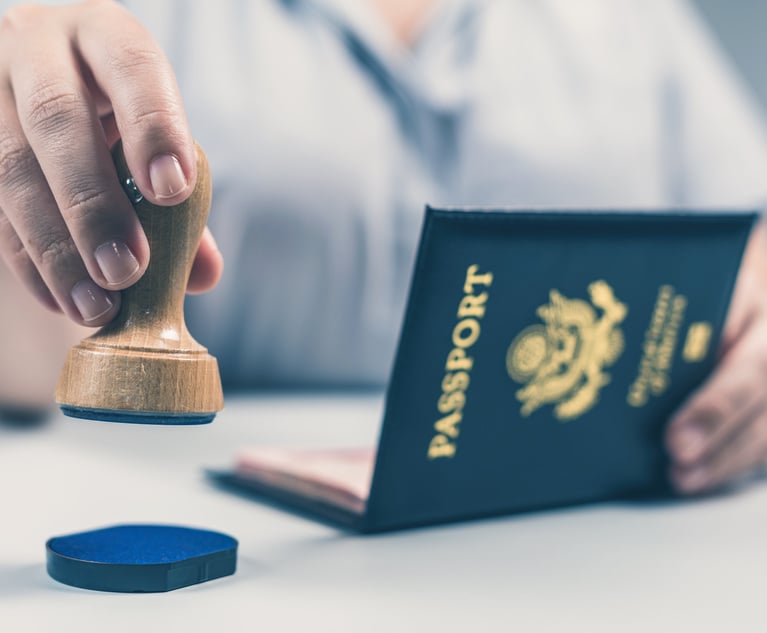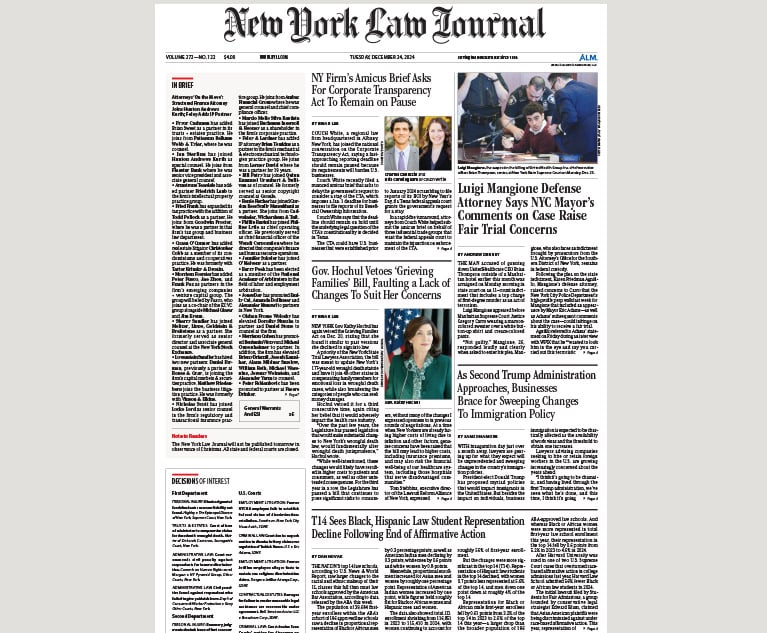 Roman Seliutin/Shutterstock.com
Roman Seliutin/Shutterstock.com Undercover '60 Minutes' Video Leads to NY Lawyer's Public Censure
Manhattan attorney and Big Law alum Marc Koplik told an undercover anti-corruption activist that lawyers have special protections "because we run the country.”
January 16, 2019 at 04:02 PM
4 minute read
A long-time New York lawyer earned himself a public censure after a “60 Minutes” segment showed him advising how to park suspicious funds in the U.S. and suggesting that American lawyers typically don't face criminal prosecution because they “run the country.”
The New York Supreme Court Appellate Division, First Department on Tuesday issued a public censure to Marc Koplik of the Manhattan-based law firm Henderson & Koplik. The lawyer was admitted to the New York Bar in 1973, and according to his law firm biography, spent part of his early career at Cleary Gottlieb Steen & Hamilton and Debevoise & Plimpton.
“He counseled a client to engage in conduct he knew was illegal or fraudulent and suggested to the client that lawyers in the United States can act with impunity,” the First Department wrote in its disciplinary ruling.
The court also noted several mitigating factors that prevented a harsher sanction, including that Koplik accepted responsibility and that his misconduct was a one-time, “aberrational” situation. Prior to the censure, Koplik didn't have a record of public discipline in New York.
Contacted at his office Wednesday, Koplik said he had not yet seen the disciplinary ruling and wouldn't comment until he reviewed it. He told a reporter to call again next week.
The disciplinary action follows Koplik's appearance in an undercover video produced by a London-based anti-corruption nonprofit group called Global Witness.
In the video footage, clips of which were included in a 2016 episode of CBS's “60 Minutes” news program, an investigator for Global Witness posed as an adviser to a West African mining minister. The supposed adviser asked a number of lawyers, including Koplik, for advice on how the fictitious mining official might move money into the U.S. through the purchase of a brownstone, private jet or other assets.
Overall, Global Witness met with 16 lawyers at 13 firms. Although neither Koplik nor any of the others ultimately agreed to be retained by the fictitious official, most of them gave informal advice to the supposed adviser, according to the nonprofit. Only one—Jeffrey Herrmann—refused outright to help, saying, “This ain't for me.”
While speaking to Koplik, the Global Witness investigator suggested that the supposed mining official may have made the money through illicit means.
“I wouldn't name it bribe; I would say facilitation money,” the investigator said while posing as a potential client, according to the First Department.
Koplik then explained how the official might move the money into the U.S. by establishing shell companies to hide its true source. He also provided assurances related to attorney-client privilege and implied that the American legal system insulates lawyers from criminal cases.
“They don't send the lawyers to jail because we run the country,” Koplik said in footage showed on “60 Minutes.”
“Another way to look at it is the old adage: A good lawyer knows the law, and a great lawyer knows the judge. Now in point of fact, I went to law school with half the judges that sit on the New York State Supreme and federal district court in New York,” Koplick continued on video shot by Global Witness. “Are they going to throw a case for you? No. But are they going to bend over backwards to be courteous to you? Yes they are.”
Koplik is the latest of at least two lawyers caught up in the Global Witness sting to have received a public censure. The First Department issued that same sanction in September to John Jankoff, another lawyer who was told by the undercover investigator that the mining official's funds were “gray money” or “black money.”
|Read More:
This content has been archived. It is available through our partners, LexisNexis® and Bloomberg Law.
To view this content, please continue to their sites.
Not a Lexis Subscriber?
Subscribe Now
Not a Bloomberg Law Subscriber?
Subscribe Now
NOT FOR REPRINT
© 2024 ALM Global, LLC, All Rights Reserved. Request academic re-use from www.copyright.com. All other uses, submit a request to [email protected]. For more information visit Asset & Logo Licensing.
You Might Like
View All

As Second Trump Administration Approaches, Businesses Brace for Sweeping Changes to Immigration Policy

As 'Red Hot' 2024 for Legal Industry Comes to Close, Leaders Reflect and Share Expectations for Next Year
7 minute readTrending Stories
Who Got The Work
Michael G. Bongiorno, Andrew Scott Dulberg and Elizabeth E. Driscoll from Wilmer Cutler Pickering Hale and Dorr have stepped in to represent Symbotic Inc., an A.I.-enabled technology platform that focuses on increasing supply chain efficiency, and other defendants in a pending shareholder derivative lawsuit. The case, filed Oct. 2 in Massachusetts District Court by the Brown Law Firm on behalf of Stephen Austen, accuses certain officers and directors of misleading investors in regard to Symbotic's potential for margin growth by failing to disclose that the company was not equipped to timely deploy its systems or manage expenses through project delays. The case, assigned to U.S. District Judge Nathaniel M. Gorton, is 1:24-cv-12522, Austen v. Cohen et al.
Who Got The Work
Edmund Polubinski and Marie Killmond of Davis Polk & Wardwell have entered appearances for data platform software development company MongoDB and other defendants in a pending shareholder derivative lawsuit. The action, filed Oct. 7 in New York Southern District Court by the Brown Law Firm, accuses the company's directors and/or officers of falsely expressing confidence in the company’s restructuring of its sales incentive plan and downplaying the severity of decreases in its upfront commitments. The case is 1:24-cv-07594, Roy v. Ittycheria et al.
Who Got The Work
Amy O. Bruchs and Kurt F. Ellison of Michael Best & Friedrich have entered appearances for Epic Systems Corp. in a pending employment discrimination lawsuit. The suit was filed Sept. 7 in Wisconsin Western District Court by Levine Eisberner LLC and Siri & Glimstad on behalf of a project manager who claims that he was wrongfully terminated after applying for a religious exemption to the defendant's COVID-19 vaccine mandate. The case, assigned to U.S. Magistrate Judge Anita Marie Boor, is 3:24-cv-00630, Secker, Nathan v. Epic Systems Corporation.
Who Got The Work
David X. Sullivan, Thomas J. Finn and Gregory A. Hall from McCarter & English have entered appearances for Sunrun Installation Services in a pending civil rights lawsuit. The complaint was filed Sept. 4 in Connecticut District Court by attorney Robert M. Berke on behalf of former employee George Edward Steins, who was arrested and charged with employing an unregistered home improvement salesperson. The complaint alleges that had Sunrun informed the Connecticut Department of Consumer Protection that the plaintiff's employment had ended in 2017 and that he no longer held Sunrun's home improvement contractor license, he would not have been hit with charges, which were dismissed in May 2024. The case, assigned to U.S. District Judge Jeffrey A. Meyer, is 3:24-cv-01423, Steins v. Sunrun, Inc. et al.
Who Got The Work
Greenberg Traurig shareholder Joshua L. Raskin has entered an appearance for boohoo.com UK Ltd. in a pending patent infringement lawsuit. The suit, filed Sept. 3 in Texas Eastern District Court by Rozier Hardt McDonough on behalf of Alto Dynamics, asserts five patents related to an online shopping platform. The case, assigned to U.S. District Judge Rodney Gilstrap, is 2:24-cv-00719, Alto Dynamics, LLC v. boohoo.com UK Limited.
Featured Firms
Law Offices of Gary Martin Hays & Associates, P.C.
(470) 294-1674
Law Offices of Mark E. Salomone
(857) 444-6468
Smith & Hassler
(713) 739-1250







